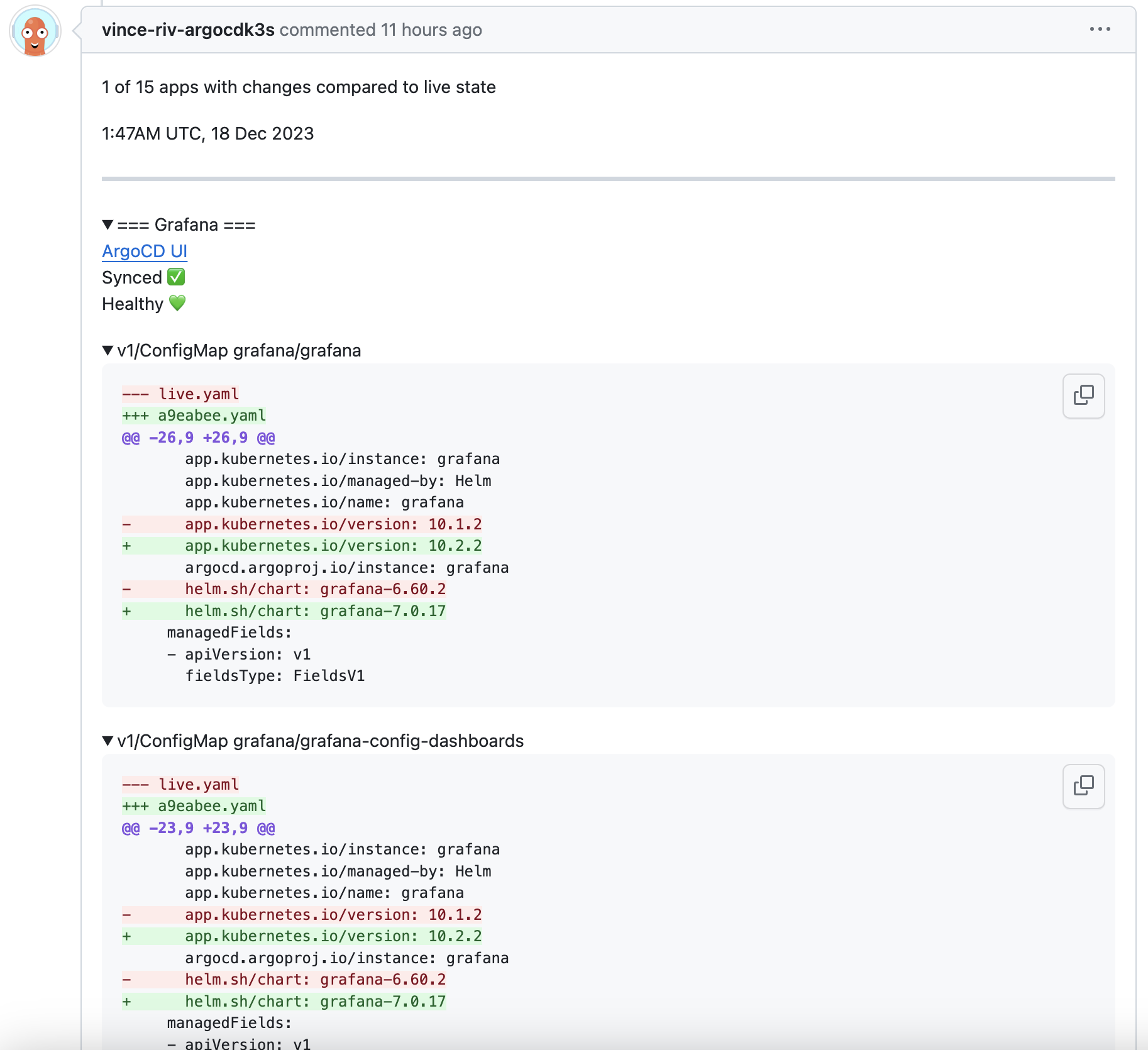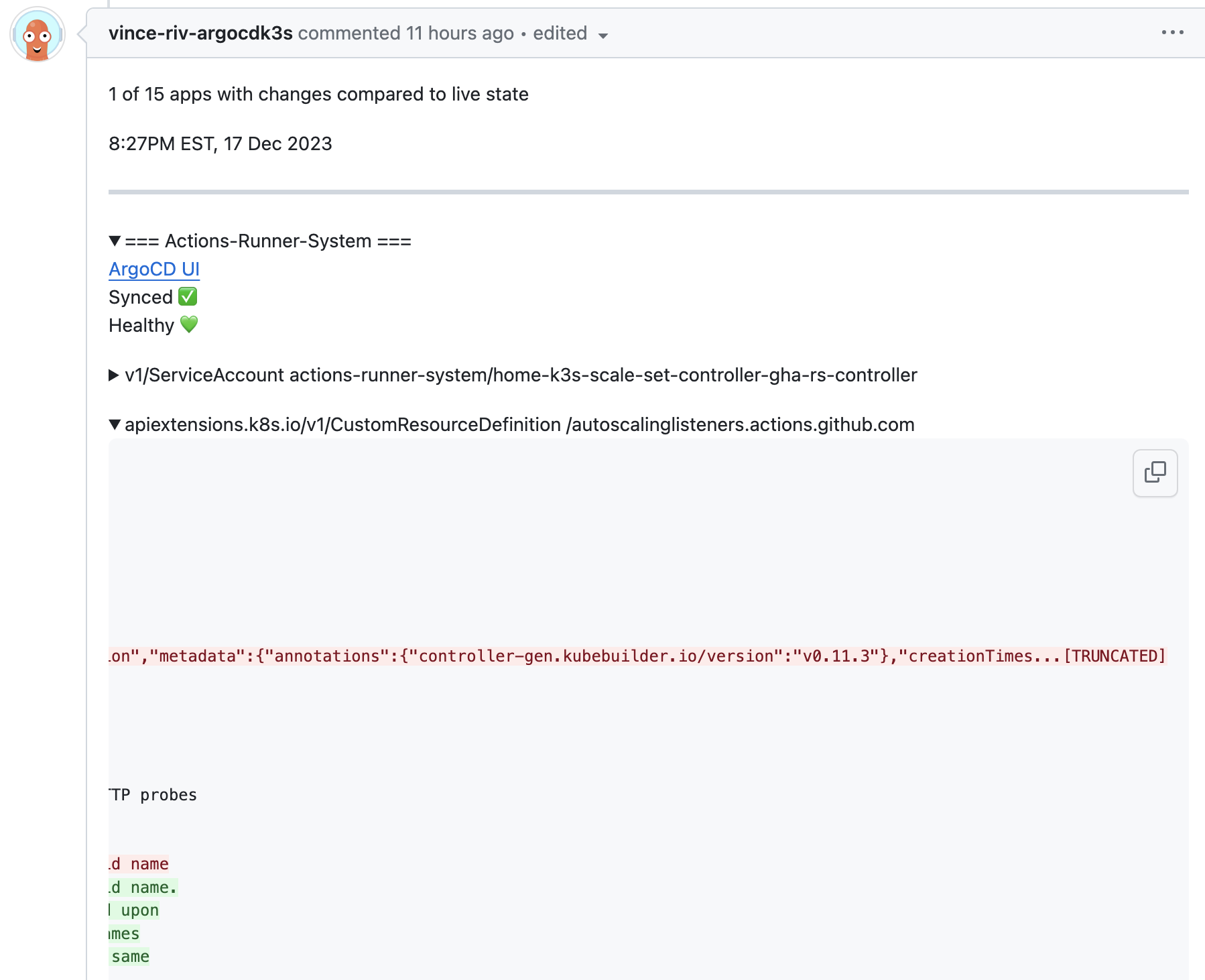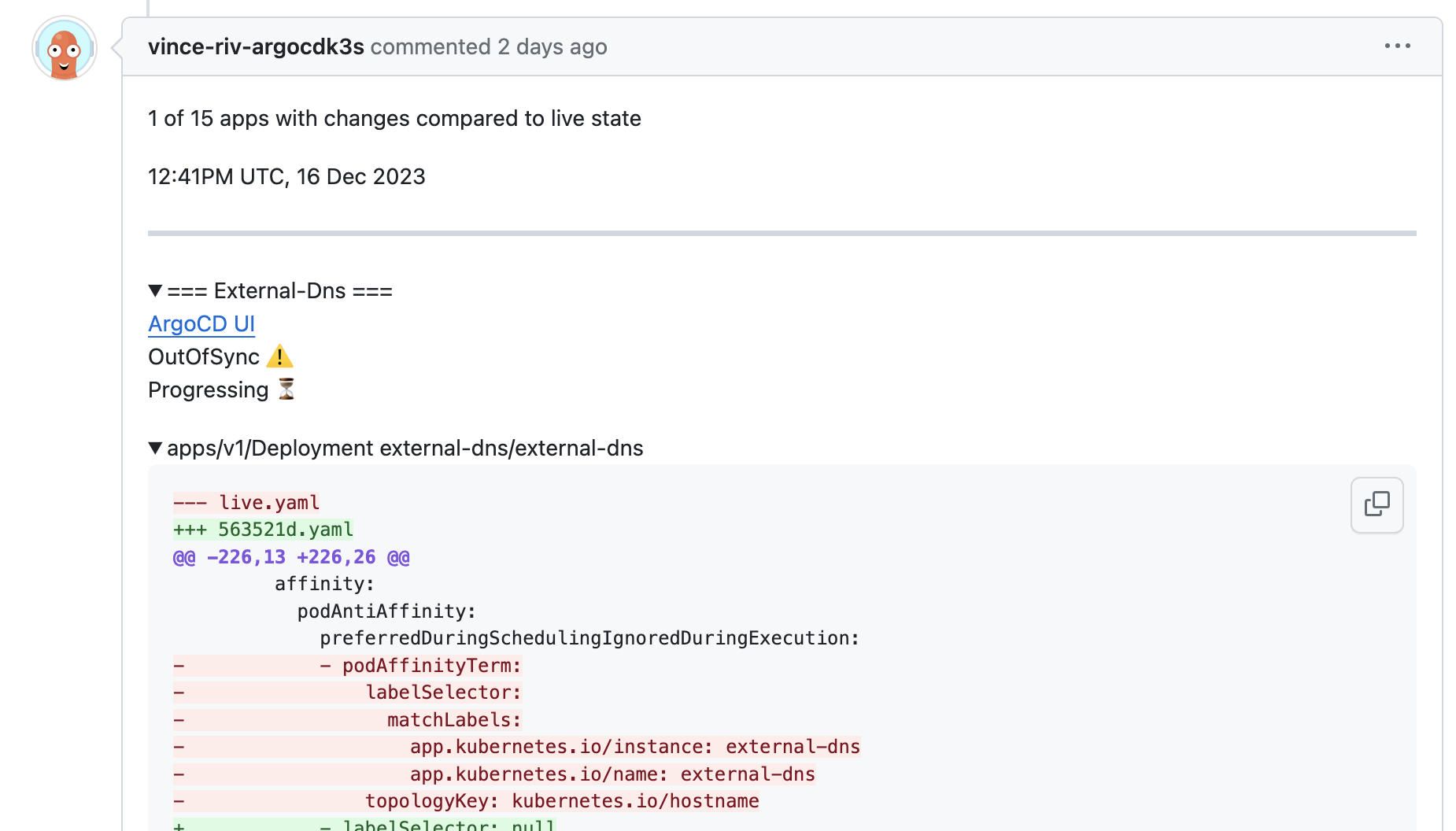Application written in go that provides Github status checks and Pull Request comments for changes to Kubernetes manifests when those manifests are delivered via ArgoCD.
Argo-diff is designed to receive webhook notifications from Gihtub for push and pull_request events. When
events are received, it queries the ArgoCD API to pull manifests for the Argo application(s) configured for
the repository that is the source of the push or pull request. It will fetch live manifests deployed to your
k8s cluster, predicted manifests generated at the revision of the change, and generate a diff.
If ArgoCD cannot generate manifests for the revision of the change, argo-diff will set its status check to a failure for that associated commit.
If the event is for a pull request, argo-diff will comment on the associated pull request with markdown displaying the diff of the manifests.
Argo-diff will not run (but may still produce status checks) in the following situations:
- Base branch of the pull request (branch in which the PR will be merged) is not the target revision for the
Argo application. (eg: Your Argo application targets
production, but your PR is to be merged intodev.) - Any git push that is not a branch. (eg: When tags are pushed, they are completely ignored by argo-diff.)
- When your application has an Automated Sync Policy configured, and commits are pushed to that application's target branch. (ie: There's no need to run argo-diff, when ArgoCD will automatically pick up the change.)
There are multiple ways to produce diff previews of proposed manifest changes to ArgoCD applications in Github Pull Requests, but they often require per-repository configuration. Because argo-diff is triggered by Github event notifications, and because argo-diff auto-discovers ArgoCD applications configured in the source code repository, no configuration is needed when repositories and/or ArgoCD applications are added and removed.
Below are screenshots of Github Pull Request comments generated by argo-diff.
- Generate a fine-grained Github Personal Access Token. It should have the following Repository permissions:
- Administration:
Read-only - Commit statuses:
Read and write - Metadata:
Read-only - Pull requests:
Read and write
- Administration:
- Create a user in your ArgoCD instance. This user should have read-only access to all applications:
- For example, in policy.csv:
g, argo-diff, role:ciandp, role:ci, applications, get, *, allow - This user shouldn't need a password but does need an API token to be generated.
- For example, in policy.csv:
- Generate a webhook secret that will be shared both by the argo-diff deployment and Github webhook config.
- Deploy to Kubernetes:
- The recommended approach is to use the Helm chart included in charts/argo-diff/:
$ helm install my-release oci://ghcr.io/vince-riv/chart/argo-diff - You can also use the example manifests in the
docs/k8s/directory to deploy argo-diff to the argocd namespace of your Kubernetes cluster. An Ingress or IngressRoute will need to be added to allow webhooks in from Github to the/webhookendpoint on the argo-diff Service.
- The recommended approach is to use the Helm chart included in charts/argo-diff/:
- Configure organizational (or perhaps just repository level?) webhook notifications to argo-diff. The Payload
URL should map the ingress configured in your cluster, and the secret should be the webhook secret
previously generated. Invididual event types to configure:
- Issue comments (for future use)
- Pull requests
- Pushes
- After the webhook is activated, the ping event should be received and verified by argo-diff and this will validate connectivity from Github to argo-diff
This is still in a proof-of-concept and alpha version state, so there are some known limitations.
- If there's a problem, and the diff comment needs to be regenerated, an admin must redeliver the webhook event associated with the PR. In the future, argo-diff may be re-initated by a comment on the PR.
- When many Argo applications are served by a single repository, performance may be slow. Manifests for eac Argo application are fetched sequentially, so this could result in argo-diff statuses and/or comments taking minutes to complete.
Set environment variables used by argo-diff and then execute go run cmd/main.go.
For example, you can place these in a file called .env.sh:
GITHUB_PERSONAL_ACCESS_TOKEN='github_pat_XXXX'
ARGOCD_AUTH_TOKEN='ABCDEFGHIJKLMNOPQRSTUVWXYZ'
ARGOCD_BASE_URL='https://argocd.your.domain'
ARGOCD_UI_BASE_URL='https://argocd.your.domain'
APP_ENV='dev'Then source it and execute go run:
$ set -o allexport ; . .env.sh ; set +o allexport
$ go run cmd/main.go
To send requests, you can copy webhook request headers and payloads to temp/curl-headers.txt and
temp/curl-payload.json and use the post-local.sh script to ship them to the local server.
There is also the /dev endpoint that gets enabled when APP_ENV=dev - this endpoint is handled by
devHandler() in main.go and can be hardcoded to specific event data.
This was originally developed by @vrivellino as a way to learn Go. Its functionality replicates that of an internal tool written by smart people at a previous job.
For contributions, please use gofmt and the following linters: errcheck, gosimple, govet, ineffassign, staticcheck, unused.


